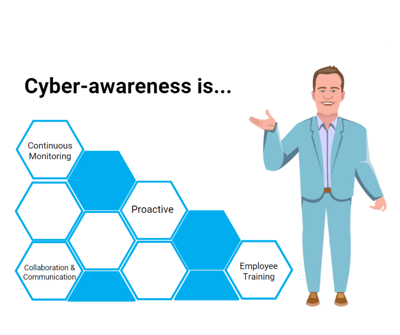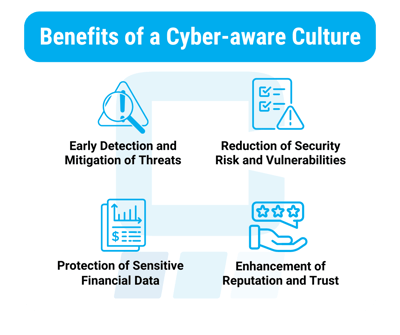
Unsurprisingly, the financial sector is a prime target for cyber threats, with organizations constantly facing challenges with protecting sensitive data, financial assets, and customer trust. As cybercriminals continue to evolve their tactics, the importance of strong cybersecurity measures has never been more critical for finance firms. In this blog, we’ll dive into why cybersecurity is extra important for the financial industry and explore the components of a cyber-aware culture. We’ll also shed light on how the experts at Charles IT, fully managed IT services in Connecticut, are empowering finance firms to navigate the complex cybersecurity landscape with confidence.
With the rapid increase of digital transactions and the interconnectedness of financial networks, the finance sector has become a lucrative target for cybercriminals seeking to exploit vulnerabilities. From data breaches and ransomware attacks to insider threats and regulatory compliance challenges, financial institutions deal with an array cybersecurity risks that demand proactive and comprehensive solutions.
At Charles IT, we recognize that effective cybersecurity requires fostering a culture of cyber-awareness that spreads to every level of the organization. A cyber-aware culture instills a sense of responsibility and vigilance among employees, empowering them to identify and mitigate potential threats before they happen. By prioritizing cybersecurity training and awareness initiatives, financial institutions can strengthen their defenses and minimize the risk of cyber incidents that could have devastating financial and reputational consequences.
What is Cyber-Awareness and What is its Significance?
Cyber-awareness is the collective mindset, behaviors, and practices within an organization that prioritizes cybersecurity and fosters a proactive approach to identifying, preventing, and responding to cyber threats. It embodies the recognition that cybersecurity is everyone's responsibility, from frontline employees to senior leadership, and highlights the role of human vigilance in complementing technology. In the financial sector, where the stakes are high and the risks are ever-present, cultivating a cyber-aware culture is important since employees work directly with sensitive financial data and must maintain operational resilience and customer trust.
Characteristics of a Cyber-Aware Culture:
- Proactive Risk Identification: Employees are encouraged to remain vigilant for potential threats and vulnerabilities. This involves promoting a mindset of skepticism and critical thinking, where employees learn to question suspicious emails or behaviors.
- Employee Training and Education: Financial institutions must invest in ongoing Cybersecurity Awareness Training that equips employees with the knowledge and skills needed to recognize and respond to cyber threats effectively. Training initiatives should include phishing awareness, password knowledge, secure data handling practices, and incident response protocols.
- Continuous Monitoring and Response: This involves implementing security controls and leveraging advanced threat detection technologies to monitor network activity, detect anomalies, and respond to potential security breaches in real-time. Additionally, financial institutions should establish clear incident response procedures and designate response teams who quickly address security incidents to minimize their impact.
- Collaboration and Communication: Financial institutions should cultivate an environment where different teams work together to share threat intelligence, coordinate response efforts, and disseminate cybersecurity best practices throughout the organization.
At Charles IT, we partner with financial organizations to develop cyber-aware cultures that prioritize security, resilience, and innovation, empowering them to thrive in a today’s digital world.
What are Some Cybersecurity Threats in the Financial Sector?
- Phishing Attacks: Hackers use deceptive emails, websites, and messages to trick employees and customers into divulging sensitive information such as login credentials, financial data, and personal details. These attacks rely on social engineering tactics to manipulate individuals into taking actions that compromise security.
- Ransomware Incidents: Cybercriminals deploy ransomware to encrypt critical data and demand payment in exchange for decryption keys, effectively holding organizations hostage until ransom demands are met. These attacks can paralyze financial systems and tarnish reputations if not effectively dealt with.
- Insider Threats: Whether intentional or unintentional, employees, contractors, or trusted third parties with access to sensitive data may misuse their privileges or inadvertently expose sensitive information.
- Data Breaches: Data breaches can lead to unauthorized access, theft, or exposure of sensitive customer information, financial records, and proprietary data. Whether through targeted cyberattacks, system vulnerabilities, or human error, data breaches can result in regulatory fines, legal liabilities, reputational damage, and loss of customer trust.
Importance of Building a Cyber-Aware Culture in Financial Firms
Employees play a pivotal role in the defense against cyber threats within financial firms. As the first line of defense, employees are often the targets of phishing attacks and social engineering tactics. By cultivating a cyber-aware culture, financial firms entrust employees to become active participants in cybersecurity defense, giving them the knowledge, skills, and awareness needed to identify, report, and mitigate potential threats.
What are the Benefits of a Cyber-Aware Culture?
- Early Detection and Mitigation of Threats: This reduces the likelihood of successful attacks and minimizes the impact on operations, finances, and customer trust.
- Reduction of Security Risks and Vulnerabilities: Employees who are educated about cyber threats and security protocols are less likely to fall victim to phishing scams, malware infections, or other cyberattacks.
- Protection of Sensitive Financial Data: Employees who are trained to recognize and respond to potential security threats are better equipped to protect confidential information, including customer financial records and transaction data.
- Enhancement of Reputation and Trust: Maintaining a cyber-aware culture enhances the reputation and trustworthiness of financial firms in the eyes of customers, investors, and regulators.
At Charles IT, we partner with financial firms to cultivate cyber-aware cultures that prioritize security, resilience, and innovation, helping them navigate the complexities of the digital landscape with confidence and success.
What are Strategies for Building a Cyber-Aware Culture?
- Leadership Commitment and Support:
- When executives and senior management prioritize cybersecurity and demonstrate their commitment to building a secure environment, employees are more likely to recognize the importance of cybersecurity and actively participate in security initiatives.
- Employee Training and Awareness Programs:
- Employee Cybersecurity Awareness Training programs give employees the knowledge and skills needed to identify and reduce cyber threats effectively. Training programs should cover:
- Identifying Phishing Attempts: Employees should be trained to recognize phishing emails, which includes knowing how to look for suspicious links and attachments, and when and how to report that suspicious activity to IT.
- Password Management Best Practices: Employees should learn how to create strong passwords that contain a mix of upper and lower-case letters, numbers, and symbols, as well as use password managers that safely store and generate complex passwords.
- Secure Remote Work Practices: Employees should learn how to secure their home network when working remotely, using virtual private networks (VPNs). They should also avoid using public Wi-Fi networks.
- Reporting Security Incidents: Employee training should consist of learning the organization’s incident response plan and their particular responsibilities in reporting and responding to a breach.
- Regular Communication and Feedback Mechanisms
-
- Organizations should communicate cybersecurity updates, reminders, and best practices regularly through channels such as email, intranet portals, and employee newsletters. Additionally, feedback like surveys can provide insight into employee perceptions of cybersecurity awareness
- Integration of Cybersecurity into Organizational Policies and Procedures:
-
- Cybersecurity should be integrated into organizational policies and procedures to ensure consistent adherence to security standards and protocols across the organization. Policies should be clearly defined, communicated, and enforced.
Charles IT will help financial organizations implement strategies for building a cyber-aware culture that’ll enhance their resilience to cyber threats and protect sensitive information.
What is the role of an MSP in Strengthening Cybersecurity Posture?
Managed Service Providers (MSPs), like Charles IT, play a crucial role in strengthening the cybersecurity posture of financial firms by providing specialized expertise, resources, and support. MSPs offer comprehensive cybersecurity solutions tailored to the needs and challenges of their clients, helping them mitigate cyber risks, protect sensitive data, and ensure compliance with regulatory requirements. By leveraging advanced technologies, best practices, and industry insights, MSPs help financial firms enhance their cybersecurity defenses.
Services Offered by MSPs to Enhance Cyber-Awareness:
- Security Training and Awareness Workshops: Charles IT offers Cybersecurity Awareness Training workshops designed to educate employees about cybersecurity best practices, emerging threats, and proactive risk mitigation strategies.
- Continuous Monitoring and Threat Intelligence: Charles IT provides continuous monitoring and threat intelligence services to detect and respond to cyber threats in real-time.
- Incident Response and Recovery Planning: Charles IT offers incident response and recovery planning services to help financial firms prepare for and respond to cybersecurity incidents effectively. In the event of a data breach, we provide rapid incident response services to minimize the impact of the incident and restore normal operations as quickly as possible.
What are the benefits of partnering with an MSP for Cybersecurity?
Partnering with MSPs offers numerous benefits for financial firms seeking to enhance their cybersecurity posture like:
- Access to Expertise and Resources: MSPs bring specialized expertise, experience, and resources to the table, enabling financial firms to leverage cutting-edge technologies, best practices, and industry insights.
- Cost-Effective Solutions: MSPs offer cost-effective cybersecurity solutions tailored to the specific needs and budget constraints of financial firms.
- Enhanced Security Posture: By partnering with MSPs, financial firms can enhance their security posture, mitigate cyber risks, and protect sensitive data, ensuring compliance with regulatory requirements like FINRA and SEC.
- Proactive Risk Management: MSPs provide proactive risk management services, including continuous monitoring, threat intelligence, and incident response planning, enabling financial firms to mitigate cyber threats before they escalate into security incidents.
- Peace of Mind: By entrusting their cybersecurity needs to MSPs, financial firms gain peace of mind knowing that their critical assets and information are protected by a team of experts, allowing them to focus on their business objectives without worrying about cybersecurity risks.
Conclusion
As financial institutions continue to face evolving cyber risks and regulatory pressures, it’s imperative for them to prioritize cyber-awareness initiatives and invest in strong cybersecurity strategies. By empowering employees with the knowledge, skills, and tools needed to recognize and respond to cyber threats, organizations can build a resilient security framework that defends their reputation if faced with a cyberattack.
At Charles IT, we urge financial institutions to make cybersecurity a top priority within their organizations. The threat landscape is constantly changing, requiring proactive and innovative cybersecurity measures to alleviate risks and protect critical assets.
As a trusted partner in cybersecurity, Charles IT is committed to helping financial institutions navigate complex cyber threats and build a resilient security framework. With our expertise, experience, and tailored solutions, we make sure that our partners stay ahead of cyber threats, safeguard their financial security, and achieve compliance with regulatory requirements. Partner with Charles IT today and take proactive steps towards protecting your organization against cyber threats!




